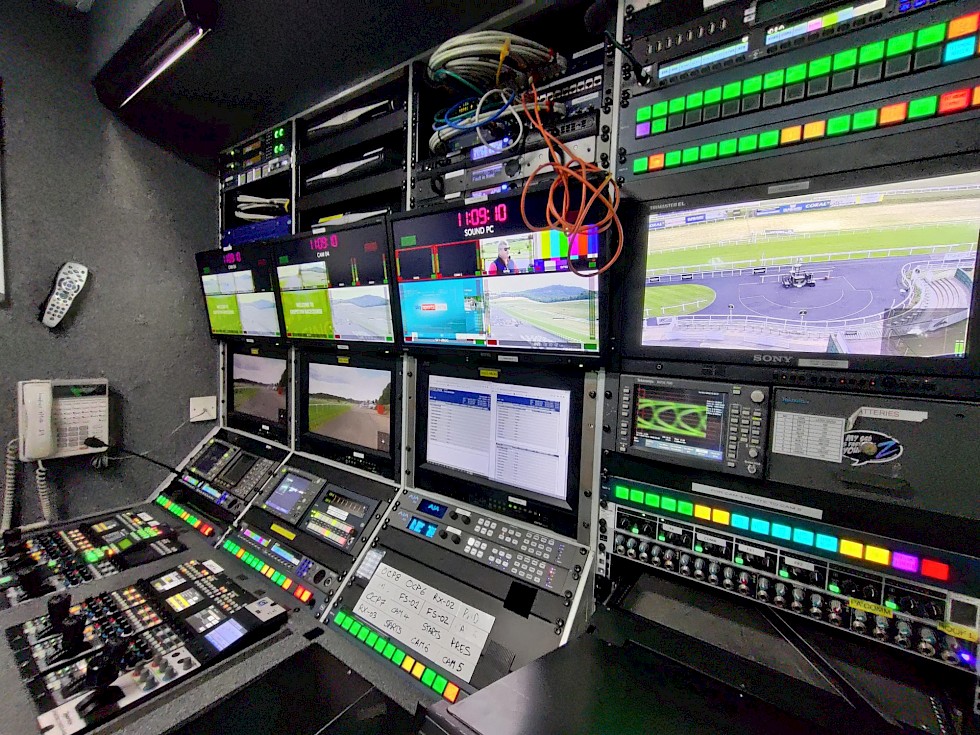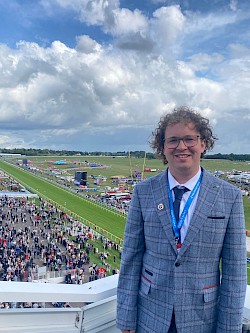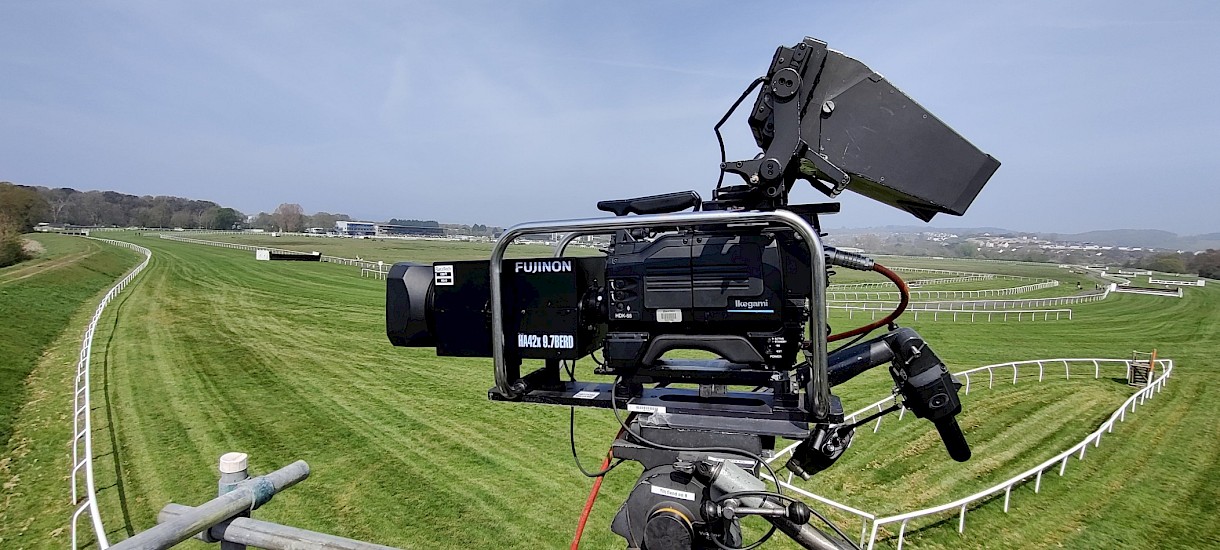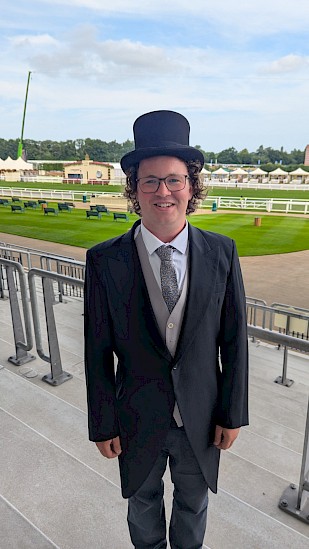From Eastbourne Youth Radio to Royal Ascot: RaceTech Broadcast Engineer Returns to Inspire Students

Former East Sussex College student and Level 3 Creative Media Production alumnus, Oscar Williams, returned to college last week for Eastbourne Youth Radio (EYR) – this time, not as a student behind the mic, but as an industry professional sharing his experience with the next generation of media creatives.
Now working as a Guarantee Outside Broadcast Engineer at RaceTech, he plays a crucial role in the live coverage of horse racing events across the UK, ensuring broadcasts run smoothly for audiences watching on Sky Sports, ITV, and international feeds.
“As an Outside Broadcast Engineer at RaceTech, I engineer and operate the technical aspects of live horse racing broadcasts across the UK,” said Oscar. “I have a broad knowledge of vision engineering, sound, radio cameras, and networking, and I work with a team of professionals to deliver high-quality and reliable coverage of this exciting sport.”

Reflecting on his journey, he says Eastbourne Youth Radio gave him his first taste of the buzz and unpredictability of live broadcasting.
“EYR gave me an insight into the buzz and excitement of live broadcasting, the arrival of unexpected problems, early hours, late nights and that ultimately the show must go on!”
After finishing college, he went on to study Television and Video Production at Southampton Solent University, gaining valuable hands-on experience while studying.
“Following EYR I spent three years at University studying Television and Video production at Southampton Solent University,” Oscar told the College. “Whilst at University I took to gain as much hands-on experience in a variety of production roles (and earn a bit of money as a student). I worked, amongst others, a lighting engineer in night clubs; sound engineer in local pubs; camera operator festivals including Bestival, Glastonbury, Kaiser Chief's and Paloma Faith; and vision engineered a R&D project involving music producer Nile Rodgers that was shortlisted at the International Broadcast Convention in Amsterdam.
“The end of university saw the emergence of COVID and a temporary hiatus for productions. I took up a temporary administrative job for a short period and took a few opportunities including working on closed door Goodwood festival of speed and a livestream with Sony music. Towards the end of COVID, a vacancy arose for a Trainee Outside Broadcast Engineer with Racetech.”
Oscar added, “Over the last four years, I completed the in-house training to become a broadcast Engineer and now regularly guarantee engineer [senior engineer] including overseeing the Royal Ascot world feed.”

When asked about his standout memories from Eastbourne Youth Radio, he recalls the energy and unpredictability of working with live performers.
“My standout memory of EYR as a student was working with the variety of different choirs and bands that the schools would bring along. You never really knew what we were going to be presented with until they arrived and adapted accordingly.”
At college, he credits both the Creative Media Production course and his tutors for providing real-world insight and confidence to take his first steps into industry.
“The tutors shared their experience of working in industry and some continued to do so,” said Oscar. “It was these small invites that helped make the practical assignments even more realistic. Professional projects like Tag Magazine and EYR helped develop softer skills that become transferable like communicating with paying clients, interviewing politicians and bands and meeting deadlines. To secure professional interviews I needed to convince press offices that our student-run publication Tag Magazine was worth their time and secured an interview for Tag magazine with BBC Sound of 2017's nominee 'The Amazons'. Developing these skills help you get your foot in the door when others would otherwise see you as 'just a student' or inexperienced.”
Working for RaceTech means no two days are the same, with races and broadcasts happening across the country.

“We follow British Horseracing around the country and across both the Flat and Jumps seasons so I could be sent to any course in the south of Britain,” said Oscar. “A typical non-festival meeting would look like: Arrive and meet up with our two rigid HGV trucks that have travelled from base. One of the trucks is our tender vehicle, this carries all our cameras, aerials, monitors, cabling, and loose equipment needed to cover a Raceday. The other truck is our scanner; this is the command centre, effectively a mobile office on wheels.
“On every Raceday we cover the racing from multiple angles and provide replays to the stewards to allow them to check for cheating and interference. The director then takes these pictures and produces a live race feed to Sky Sports and/or Racing TV, ITV, overseas broadcasters and to betting shops. We also produce coverage for the onsite big screens.”
One of the most memorable moments in his career so far has been covering one of the UK’s most prestigious sporting events.
“The most exciting and challenging event I've covered so far is ‘Guaranteeing the World’ feed for Royal Ascot. The world feed, as its name entails, is shown on TV channels, bookmakers and online platforms worldwide. The bonus cool side is that I had access to the royal enclosure, an invite only part of the event; though I did need to wear a top hat and tails.”
He says the fast-paced nature of broadcasting demands strong communication and adaptability - skills he first learned at Eastbourne Youth Radio.
“The most important skills I learnt in college were communication skills with clients and interviewing contributors. Working with sponsors on EYR and interviewing contributors. Technical requirements change, professional workflows change, but soft skills and interpersonal skills don't change.”
For students dreaming of a career in TV, film or live broadcasting, his advice is simple - get hands-on experience and keep experimenting.
“Gain as much practical experience as you can. Volunteer for student radio or hospital radio. If you're near a racecourse, reach out to racetech. We often have students for a day or a few weeks shadowing different areas of our broadcast operations.
“Make films, we all have professional quality cameras in our pockets, a vast amount of video journalism is now streamed or filmed on smartphones. There's lots of free editing apps and Adobe offers a reduced student plan. If you don't know what you want to do, and I didn't know when I was in college, try everything, the industry has for a long time been multi-modal and multiskilled.”